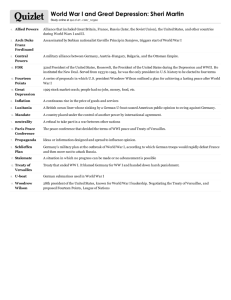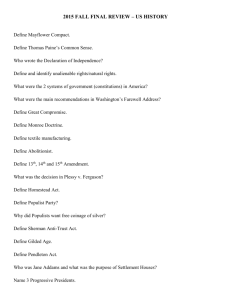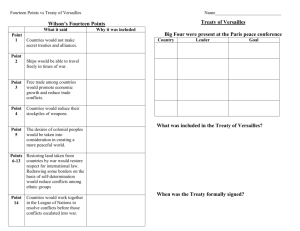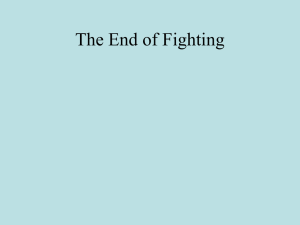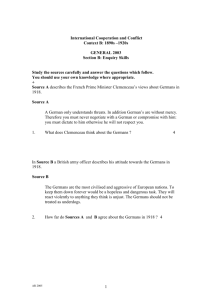File
advertisement
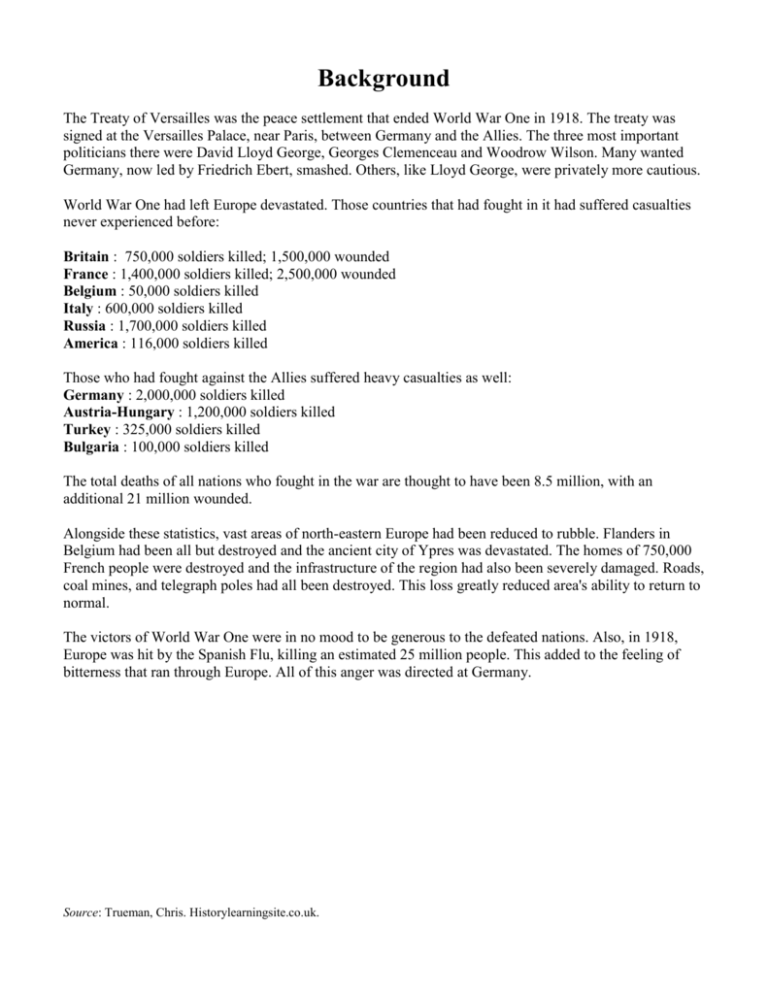
Background The Treaty of Versailles was the peace settlement that ended World War One in 1918. The treaty was signed at the Versailles Palace, near Paris, between Germany and the Allies. The three most important politicians there were David Lloyd George, Georges Clemenceau and Woodrow Wilson. Many wanted Germany, now led by Friedrich Ebert, smashed. Others, like Lloyd George, were privately more cautious. World War One had left Europe devastated. Those countries that had fought in it had suffered casualties never experienced before: Britain : 750,000 soldiers killed; 1,500,000 wounded France : 1,400,000 soldiers killed; 2,500,000 wounded Belgium : 50,000 soldiers killed Italy : 600,000 soldiers killed Russia : 1,700,000 soldiers killed America : 116,000 soldiers killed Those who had fought against the Allies suffered heavy casualties as well: Germany : 2,000,000 soldiers killed Austria-Hungary : 1,200,000 soldiers killed Turkey : 325,000 soldiers killed Bulgaria : 100,000 soldiers killed The total deaths of all nations who fought in the war are thought to have been 8.5 million, with an additional 21 million wounded. Alongside these statistics, vast areas of north-eastern Europe had been reduced to rubble. Flanders in Belgium had been all but destroyed and the ancient city of Ypres was devastated. The homes of 750,000 French people were destroyed and the infrastructure of the region had also been severely damaged. Roads, coal mines, and telegraph poles had all been destroyed. This loss greatly reduced area's ability to return to normal. The victors of World War One were in no mood to be generous to the defeated nations. Also, in 1918, Europe was hit by the Spanish Flu, killing an estimated 25 million people. This added to the feeling of bitterness that ran through Europe. All of this anger was directed at Germany. Source: Trueman, Chris. Historylearningsite.co.uk. Attitudes The treaty was signed after months of negotiation amongst the "Big Three" as to what the treaty should contain. The "Big Three" were David Lloyd George of Britain, Georges Clemenceau of France and Woodrow Wilson of the United States. David Lloyd George had two views on how Germany should be treated. In private, Lloyd George was concerned with the rise of Communism in Russia and feared that it might spread. Lloyd George believed that the spread of communism posed a far greater threat than a defeated Germany. He did not want the people of Germany to become so upset with their government that they turned to communism. He did not want Germany treated with lenience, but he knew that Germany would be the only country that could stop communism if it expanded from Russia. However, it would have been political suicide to have gone public with these views. He was a politician, and politicians need support for elections. If he had come across as being soft on Germany, he would have been voted out of office. The British were after revenge and Lloyd George's public image reflected this mood. Lloyd George, looking for support, echoed these views. Georges Clemenceau of France had one very simple belief - Germany should be brought to its knees so that she could never start a war again. This reflected the views of the French public and also Clemenceau’s personal beliefs. He had seen France defeated twice by Germany and refused to allow Germany to do it again. He did not have to adapt his policies to suit the French public - the French leader and the French public both thought alike. Woodrow Wilson of America had been genuinely stunned by the savagery of the war. He could not understand how “advanced” civilization reduced an entire continent to rubble and ashes. In America, there was a growing desire for the government to adopt a policy of isolation and leave Europe to itself. Wilson believed that Germany should be punished but in a way that would lead to European reconciliation, as opposed to revenge. He had already written what he believed the world should be like in his "Fourteen Points" The main points in this document were: 1) No more secret treaties 2) Countries must seek to reduce their weapons and their armed forces (Disarmament) 3) National self-determination should allow people to govern themselves. 4) All countries should belong to the League of Nations. Therefore, the three victorious nations were far from united about how Germany should be treated. The eventual treaty seemed to satisfy all of the Allies. For France, it appeared as if Germany had been smashed; for Britain, Lloyd George was satisfied that enough of Germany's power had been left to act as a buffer to communist expansion; Wilson was simply happy that the proceedings had finished so that he could return home. Source: Trueman, Chris. Historylearningsite.co.uk. The Terms The Treaty of Versailles can be divided into four sections; territorial, military, financial and general. Territorial The following land was taken away from Germany: Alsace-Lorraine (given to France) Eupen and Malmedy (given to Belgium) Northern Schleswig (given to Denmark) Hultschin (given to Czechoslovakia) West Prussia, Posen and Upper Silesia (given to Poland) The Saar, Danzig and Memel were put under the control of the League of Nations and the people of these regions would be allowed to vote to stay in Germany or not in a future referendum. The League of Nations also took control of Germany's overseas colonies. Germany had to return to Russia land taken in the Treaty of Brest-Litovsk. Some of this land was made into new states: Estonia, Lithuania and Latvia. Poland also received some of this land. Military Germany’s army was reduced to 100,000 men and they were not allowed to have any tanks. Germany could not have an air force. Germany was allowed only six battleships and no submarines. No German soldiers or weapons were allowed into a new demilitarized zone (DMZ) 50 miles between France and Germany. The Allies were to keep an army of occupation on the German border for 15 years. Financial Many of the territory that Germany had to give other countries were important industrial regions. Because of this, the German economy was crippled. Coal, in particular, was an important loss. Without it, many Germans froze over the next several winters. Reparations were the worst part. For information on this, see number 2 in the next section. It seemed clear to Germany that the Allies wanted to bankrupt their country. General There are three vital clauses here: 1. Germany had to admit full responsibility for starting the war. This was Clause 231 - the infamous "War Guilt Clause". 2. Because of Clause 231, Germany was responsible for all the damage caused by the First World War. Therefore, she had to pay reparations, the bulk of which would go to France and Belgium to pay for the damage done to both countries by the war. Reparations would be used to pay for that damage to be repaired. The total amount was not set at Versailles - it was to be determined later. The Germans were told to write a blank check which the Allies would cash when they wanted. The figure was eventually put at 6,600 million British Pounds (Over 300 billion dollars in today’s money). 3. A League of Nations was set up to keep world peace. Source: Trueman, Chris. Historylearningsite.co.uk. German Reaction After agreeing to the Armistice, the Germans though they would be consulted on the contents of the Treaty. This did not happen. However, the Germans were in no position to continue the war. Though this lack of consultation angered them, there was nothing they could do about it. The first time the German representatives saw the terms of the Treaty was just weeks before they signed it. When the terms were made public, anger spread throughout Germany. Although many in Germany did not want to sign the treaty, but they knew that they had no choice. Germany was not capable of restarting the war due to a lack of soldiers. Germany was essentially given two choices: 1) Sign the treaty or 2) Be invaded by the Allies. They chose to sign the treaty. When the ceremony was over, Clemenceau went out into the gardens of Versailles and said, "It is a beautiful day". The treaty seemed to satisfy the "Big Three." In their eyes, it was a just peace. It kept Germany weak yet strong enough to stop the spread of communism, kept the French border with Germany safe from another German attack, and created the League of Nations, an organization that would end prevent wars from starting. However, it left a mood of anger throughout Germany as it was felt that Germany had been treated unfairly. Above all else, Germany hated the clause blaming her for the cause of the war and the financial penalties that the treaty imposed on Germany. Those who signed it (although they had no choice) became known as the "November Criminals". Many German citizens felt that they were being punished for the mistakes of the German government. In their eyes, it was the government that had declared war, not the people. Source: Trueman, Chris. Historylearningsite.co.uk. Conclusion Perhaps the worst part about the Treaty of Versailles was that it helped pave the way for the rise of a dangerous man willing gain power by telling the German people what they wanted to hear. The German military was severely reduced by the Treaty of Versailles. Even though they were not supposed to have an air force and only a small army and navy, Germany found ways around this. They trained their pilots and sailors secretly or in other countries. They trained a massive reserve army, much like our National Guard. This made it look like they were obeying the terms of the treaty while secretly training for the next war. Because of the treaty, Germany was bankrupted. The incredible poverty and starvation that swallowed Germany because of the Treaty of Versailles led to German misery and a feeling of hopelessness. This paved the way for a German politician to enter the lives of the German people and promise a better future if they followed him. The War Guilt Clause in the Treaty of Versailles laid all of the blame for World War One squarely on the shoulders of Germany. Germany rightly felt as though this was a vast oversimplification of the truth. No one enjoys taking the blame for something. One politician was able to convince the German people that World War One was NOT their fault. He instead shifted the blame to minority groups within the country: Jews, Blacks, Gypsies, the disabled, and homosexuals. In case you haven’t figured it out yet, that politician was Adolph Hitler. Source: Trueman, Chris. Historylearningsite.co.uk.
